|
|
|
Sort Order |
|
|
|
Items / Page
|
|
|
|
|
|
|
| Srl | Item |
| 1 |
ID:
099051


|
|
|
|
|
| Publication |
2010.
|
| Summary/Abstract |
In this article, we depict climate as an issue which deterritorialises existing geopolitical realities in a manner which suits the discourses of both elite science and corporate globalisation. In this deterritorialisation, the politics of place, of difference, are removed; the divisions between North and South - the Minority and Majority Worlds - must melt away as all peoples become citizen-consumers in need of a morally conservative (using global archetypal myths of flood and fire) but economically neo-liberal global soul with which to confront the global nemesis of climate change. This deterritorialisation is constructed from a Northern (particularly a Western European) position. It emerges from post-material and post-industrial environmental discourses, largely ignoring the discourses and frames of post-colonial environmentalism (and environmental debt) which are far more appropriate when describing the environmental and developmental realities of the Global South. In the article, we introduce the case of India, as both its civil society and governments wrestle with the new realities of the global climate change agenda. We show how India's official framing of climate change discourse, overwhelmingly dictated and driven by the imperatives of economic growth, continues to oscillate between the 'scientific' underpinnings of deterritorialised-global representations of climate change and the growing trends to reterritorialise multifaceted climate space through geopolitical-geoeconomic reasonings.
|
|
|
|
|
|
|
|
|
|
|
|
|
|
|
|
| 2 |
ID:
099050
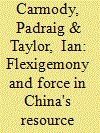

|
|
|
|
|
| Publication |
2010, 2010.
|
| Summary/Abstract |
The Chinese government and its companies have dramatically increased their presence in Africa in the last decade. There has been much media interest and commentary on the impacts of this engagement on governance in Africa, as it is often seen to be strengthening authoritarian states, such Sudan and Zimbabwe.1 However, Chinese actors are also engaging with more democratic states and spaces, such as Zambia. This article seeks to explore the impacts of increased Chinese engagement with Africa on governance through a comparative case study of two contrasting cases: Sudan and Zambia, using the concept of flexigemony. Contrary to popular perception, behaviour by Chinese actors has sometimes been a moderating force in Sudan, while provoking violence in Zambia.
|
|
|
|
|
|
|
|
|
|
|
|
|
|
|
|
| 3 |
ID:
099055


|
|
|
|
|
| Publication |
2010.
|
| Summary/Abstract |
This article challenges popular claims about the capacity for microfinance to reduce poverty and empower women in the global South. Instead, I posit microfinance as a contradictory development tool, one that creates possibilities for both the contestation and continuation of unequal social relations at multiple scales. The article is divided into two major sections. I begin by examining the assumptions embedded in mainstream financial mappings of global space since the 1980s. In particular, I show how they privilege the transnational mobility of corporate capital and elide the everyday, place-based work of social reproduction. I examine the expansion and commercialisation of microfinance in this context, as an alternative mechanism for enabling poor households to continue meeting their everyday needs by taking on more debt. In the second section, I draw on fieldwork in Andhra Pradesh, India, to show how these interlocking macro/micro financial flows interact with regional social histories to shape and differentiate people's mobility 'on the ground' according gender, caste, and class. I conclude by suggesting how a critical geopolitics framework can help formulate new questions about microfinance as a development strategy.
|
|
|
|
|
|
|
|
|
|
|
|
|
|
|
|
| 4 |
ID:
099047
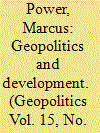

|
|
|
|
|
| Publication |
2010.
|
| Summary/Abstract |
The Global South is everywhere, but it is also always somewhere, and that somewhere, located at the intersection of entangled political geographies of dispossession and repossession, has to be mapped with persistent geographical responsibility.
|
|
|
|
|
|
|
|
|
|
|
|
|
|
|
|
| 5 |
ID:
099054
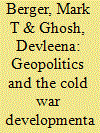

|
|
|
|
|
| Publication |
2010.
|
| Summary/Abstract |
Contrary to the view of some observers who insist that the Cold War was of limited or no relevance to the transition from colonies to nation-states after 1945 we argue that the geopolitics of the Cold War played a crucial role in shaping the character and direction of the trajectories of nation-states in Asia, if not the erstwhile Third World as a whole. More particularly, the geopolitics of the Cold War provided the crucial backdrop for the rise and fall of developmental nationalism, while the post-Cold War era has set the scene for an array of cultural nationalisms. These issues are explored with a particular focus on India. The case of India makes clear that it is impossible to separate the emergence of new nation-states and their success or failure after 1945 from the geopolitics of the Cold War. It will also make clear that the shifting geopolitics of the end of the Cold War reinforced the demise of developmental nationalism. Since the late 1980s, the problems facing the nation-states of the former Third World, are being played out in a geo-political context, which includes an important shift from developmental nationalisms to cultural nationalisms, while the nation-state system itself is sliding deeper into crisis against the backdrop of the global framework of 'genuinely existing' liberal capitalism and the changing geopolitics of the early twenty-first century.
|
|
|
|
|
|
|
|
|
|
|
|
|
|
|
|
| 6 |
ID:
099052


|
|
|
|
|
| Publication |
2010.
|
| Summary/Abstract |
Dire warnings on the "dangers" of climate change are reinvigorating past debates over environmental security. However, one strain of this debate is exceeding the state-based logics of security found in more conventional environmental security approaches. The UNFCCC's goal of avoiding "dangerous climate change" that, inter alia, threatens sustainable development has inspired volumes of research on climate change mitigation and adaptation, and has increasingly become incorporated into World Bank and UN development programmes. However, much of this research has yet to examine the cultural and political effects of framing climate change through the loaded language of security. As a result, there has been little critical analysis of the emergence of a variety of disaster risk management and insurance-based adaptation strategies that attempt to offer security against the effects of dangerous climate change. This article articulates the insights of critical environmental security studies with recent research on biopolitical security and post-structural critiques of development to unpack the biopolitical and geopolitical assumptions that animate discourses on dangerous climate change and disasters. My argument here is twofold. First, I suggest that risk management and catastrophe insurance have political effects: these biopolitical technologies sustain the global social and political order that the history of Western-led "development" has produced. Second, along these lines, dangerous climate change discourses extend the project of earlier environmental security discourses, specifically, the attempt to secure Western ways of life against the effects of environmental change. In securing "sustainable development," discourses on dangerous climate change combine biopolitical technologies of risk management with geopolitical technologies of security to sustain the exclusion and containment of underdeveloped populations, and the mobility of the global elite, that characterise contemporary practices of development.
|
|
|
|
|
|
|
|
|
|
|
|
|
|
|
|
| 7 |
ID:
099053


|
|
|
|
|
| Publication |
2010.
|
| Summary/Abstract |
The recent establishment of the US Africa Command (AFRICOM) embodies the resurgence of counterinsurgency arguments within the transformation of the US military. The command's emphasis on its "non-traditional" character that includes civil activities, a focus on the population's security, as well as its interagency approach intensified the controversy about the role of the military in US foreign policy. Rather than merely focusing on how to succeed in asymmetric warfare, AFRICOM proposes a long-term commitment of US forces in situations where violent conflict is not apparent and has to be prevented. This "proactive peacetime engagement" on the continent targets crucial communities and their perceptions through humanitarian and development projects. Africa is likely to become a testing ground for the US military's expansion into "non-traditional" activities ranging from counterinsurgency to conflict prevention. Blending security and development in this radical way may make the distinction between civil and military intervention vanish.
|
|
|
|
|
|
|
|
|
|
|
|
|
|
|
|
| 8 |
ID:
099048
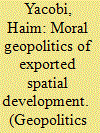

|
|
|
|
|
| Publication |
2010.
|
| Summary/Abstract |
This article will analyse Israel's past involvement (1956-1973) in Africa, in the context of a wider theoretical conceptualisation of the role of spatial development in the construction of moral geopolitics. Re-thinking the relevance of postcolonial critiques, the paper examines the political and institutional setup underlying Israeli involvement in development in Africa, documenting the scope of this phenomenon by looking at policy makers, professionals and institutions, studying the role of spatial development and planning in the design of Israel's policies, and analysing the actual results of such projects. Despite considerable Israeli involvement and investment in spatial development projects in postcolonial Africa, the existing literature on the subject is narrow, dealing mainly with pragmatic political interests, and there is hardly any structured documentation of Israel's exported spatial development to Africa - its scope, qualities, successes or failures. Moreover, in the wider literature the analysis of spatial development as "exported" knowledge is perceived as a by-product of the polity between Empires and the Margins - an assumption that this paper aims to question.
|
|
|
|
|
|
|
|
|
|
|
|
|
|
|
|
| 9 |
ID:
099049
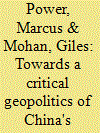

|
|
|
|
|
| Publication |
2010.
|
| Summary/Abstract |
China, in its quest for a closer strategic partnership with Africa, has increasingly dynamic economic, political and diplomatic activities on the continent. Chinese leaders and strategists believe that China's historical experience and vision of economic development resonates powerfully with African counterparts and that the long-standing history of friendly political linkages and development co-operation offers a durable foundation for future partnership. Both in China and amongst some Western commentators a form of exceptionalism and generalisation regarding both China and Africa has been emerging. In this article instead we seek to develop theoretical tools for examining China as a geopolitical and geoeconomic actor that is both different and similar to other industrial powers intervening in Africa. This is premised on a political economy approach that ties together material interests with a deconstruction of the discursive or 'extra-economic' ways by which Chinese capitalism internationalises. From there we use this framework to analyse contemporary Chinese engagement in Africa. We examine the changing historical position of Africa within Beijing's foreign policy strategy and China's vision of the evolving international political system, looking in particular at China's bilateral and state-centric approach to working with African 'partners'. Chinese practice is uncomfortable and unfamiliar with the notion of 'development' as an independent policy field of the kind that emerged among Western nations in the course of the 1950s and increasingly China has come to be viewed as a 'rogue creditor' and a threat to the international aid industry. Rather than highlighting one strand of Chinese relations with African states (such as aid or governance) we propose here that it is necessary to critically reflect on the wider geopolitics of China-Africa relations (past and present) in order to understand how China is opening up new 'choices' and altering the playing field for African development for the first time since the neo-liberal turn of the 1980s.
|
|
|
|
|
|
|
|
|
|
|
|
|
|
|
|
|
|
|
|
|